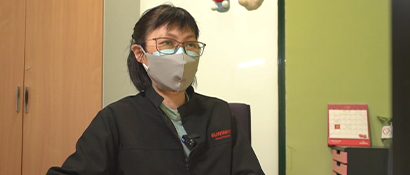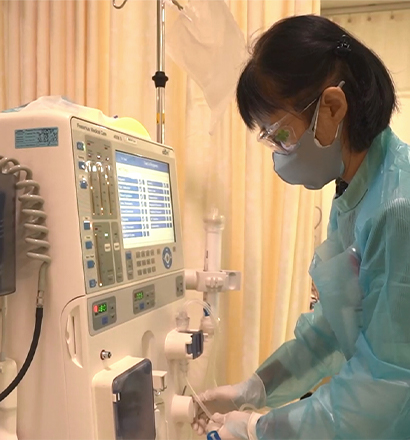A day in the life of Jenny Chong, The Story of a Renal Transplant Nurse
10 March 2022
How long have you been working as a nurse and what is your sub-specialty?
Including my training, I have been working as a nurse for 31 years. I started as a surgical ward nurse for almost 4 years before I moved on to work as a hemodialysis nurse since 1998. The change was for me to learn a specialized skill and not have to be on night duties.

Ms. Jenny Chong, Senior Staff Nurse
Renal Transplant Nurse
What is your training pathway in renal transplant?
I completed my Post Basic Renal Nursing in 2012 where I learned a lot about kidney transplant. However, it was when I was appointed as a Renal Nurse Transplant Coordinator and worked with different people that I learned the most about renal transplant.
My mentor, Ms Bowie first taught me how to coordinate a Kidney Transplant Case. From pre-transplant assessments, preparing for surgery, discharging patients, and then briefing them on post-discharge care and follow ups.
I also learned from assisting Dr Rosnawati, a Transplant Nephrologist at her clinic, where we would also have many Q&A sessions. Then there is a Renal Trained Pharmacist Ms Madeline, who taught me about Therapeutic Drug Monitoring (TDM) of immunosuppression drugs.
Finally, people like Dr Murali, the Kidney Transplant Surgeon, lab staff, dietitans, physiotherapists and so on have also played a big role in helping me learn the tricks of the trade.
These days, I continue building my knowledge through webinars and workshops organised by the Malaysian Society of Transplantation.
What is your daily routine/task in renal transplant?
I assist with all aspects of the renal transplant process. These include planning & coordination of all aspects of clinical care for both potential & actual transplant candidates & recipients.
I will educate my patients and their families on various treatment options for end stage kidney failure. Then, I will coordinate the tests as required to evaluate living donors & recipients of renal transplant.
Following the investigations, I will update the Transplant Nephrologist on results such as blood results, radiology report, and special diagnostic reports. Besides, I will record the patient’s pre-transplant data such as vaccination record, lab data, and radiology report to prepare them for the transplant.
I also manage all appointments, reports and follow up of my transplant patients with International Development Association (IDA), Transplant Surgeon, Cardiologist, Endocrinologist, Psychiatrist, Vascular Surgeon & Dietitian.
Last but not least, I help in the Hemodialysis Unit when they are short of staffing because I can use this opportunity to continue educating potential patients about the option of kidney transplantation.
What makes your role as a renal transplant coordinator different from a dialysis nurse?
Being a renal transplant coordinator, my role is more diverse. I see patients with end-stage renal disease who are awaiting transplants as well as those who are interested in donating a kidney. I also see kidney transplant recipients for routine follow-ups in the clinic, or for concerns such as rejection, infection and blood pressure management. A large part of my job involves educating patients and families about test results, treatment recommendations and self-care tips.
Dialysis nurses on the other hand have a more straightforward task. They take care of patients and manage the patients who are receiving dialysis to treat end-stage kidney disease. They oversee dialysis from start to finish, including monitoring the patient, administering medication, and educating patients and their families.
So, while the category of patients we assist are similar, our roles are very different.

What do you enjoy most about being a renal transplant coordinator?
I love building relationships with patients and families while providing education that enables them to be active members of their own healthcare team. In kidney transplant, the survival of the transplant depends on patients complying with their medication regime every day for the rest of their lives. For people who were just diagnosed with kidney conditions, they can slow down the disease progression through dietary and lifestyle modifications. I am passionate about giving patients the information they need so they have the knowledge to take ownership over their health.
What was your most rewarding moment being a renal transplant coordinator?
For me, the best part of my career is being able to see someone who is really sick return to good health. I’ve seen children return to college, dialysis patients who were difficult to deal with become cheerful, happier and more approachable. I’ve also heard of patients who get married and now have children of their own.






